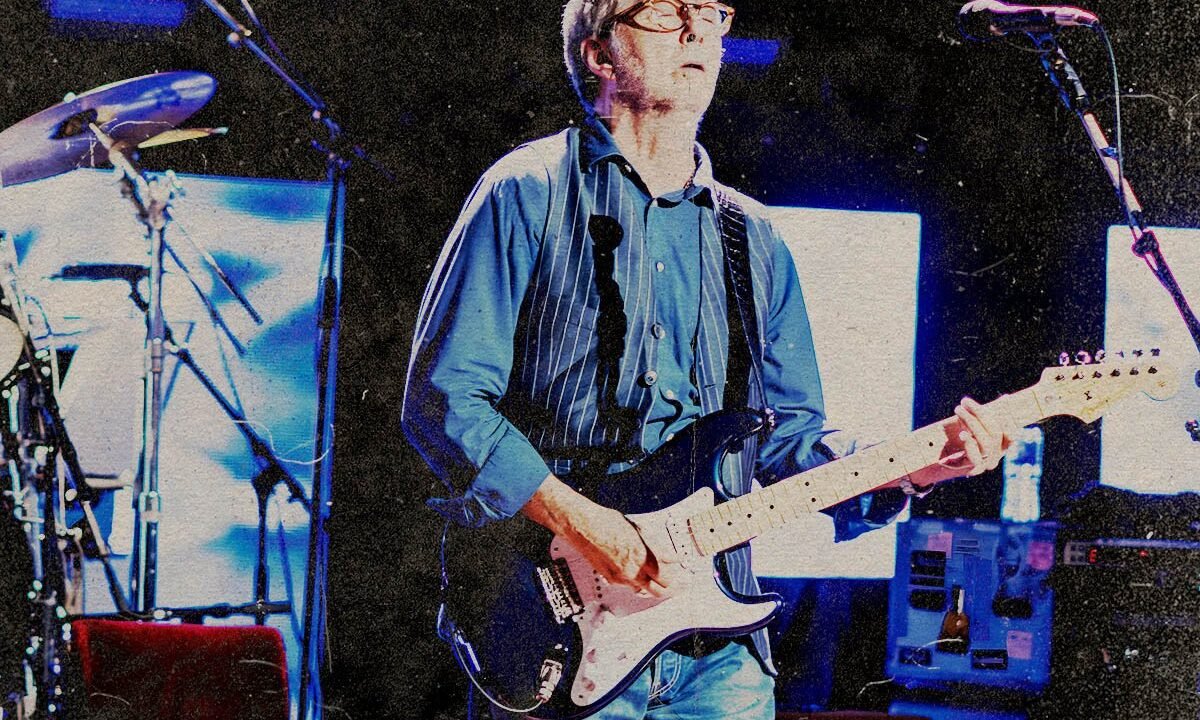

(Credits: Far Out / Raph Pour-Hashemi)
For most 1960s musicians, discovering the blues was a love affair they’d never come back from. Like gazing upon the form of a future love in a smoke-filled room, blues was to many rock virtuosos the beating heart of everything they’d ever do, the kind that inspired Keith Richards to one day say, “I loved rock’n’roll but we found, of course, that it was the blues.” Eric Clapton was no different.
Clapton was as taken with the blues as many of his contemporaries, because, more than just brushed away with a simple explanation about it being the foundation of rock in one way or another, blues generally gave rock everything it had, evoking the kind of emotion and energy that others sought to replicate by any means possible. Many of the time’s major players like Clapton also fell in love with the versatility of it as a genre and art form, particularly when scoping out the potential of the guitar and its place not only as an instrument but as a powerful source of storytelling.
As someone always keen on moving at a firm pace, Clapton also saw blues as a conduit for fluidity, with much of these elements crossing over even into the lesser blues compositions, where it became so deeply rooted in everything he did (even the Unplugged version of ‘Layla’ has its moments, pulling on the emotionality unmistakably rooted in blues). But sometimes it was far more direct than even that, with certain songs emerging straight from other blues standards like ‘Lawdy Mama’ before becoming their own thing.
That’s not to say that it comes naturally to Clapton at all times. In fact, blues might be his true love, but it takes a lot of willpower to keep in touch with it, meaning that, sometimes, he feels distant from it entirely. But that is never for lack of trying. Rather, it’s such an intricate part of his artistry that he almost sees it as an exact science: it’s a deep-seated appreciation but not so much an instinctive skill. Suppose that’s more a testament to just how hard it is a genre to master, after all.
Why Clapton sees blues as both his first love and hardest challenge
“What I’ve found is when I’m not playing the blues totally full time, my experience of it and my ability to play it is decreased,” Clapton told John Pidgeon. “If I’m playing songs from Journeyman like No Alibis or Pretending or White Room or whatever, it would be from the catalogue of my rock albums, I have to find a way to get the blues playing in there somehow, but what it is, it’s kind of rock orchestral music.”
Interestingly, Clapton also said that doing so – exercising those natural abilities – is when he’s the most “in tune with who I am”, which also goes back to what he first set out to do when he first started. For him, it wasn’t about being the next best rockstar. All he wanted to do was play blues in a good blues band, or, as he put it, “the real thing”.
In the same interview, he explained: “I liked the Kalin Twins and my first record was the Kalin Twins’ When, but I didn’t want to be in the band. I wanted to be in Freddie King’s band or Buddy Guy’s band, that’s the band I wanted to be in – the real thing.” Adding: “I didn’t want to be in a white rock band, I didn’t want to be in a black rock band, I wanted to be in a black blues band, so if I stay here for a while, it’s for a definite purpose.”
While there would have likely been challenges with both of those scenarios, there’s no doubt about the curiosity that comes with imagining Clapton in action in either of these groups. But then again, it’s likely he would have risen to any sort of creative challenge, even if the foundations seemed entirely different, because to him, it was only ever about letting that passion bleed out of the instrument, like an explosion of powerful emotion longing fighting to break free.
Related Topics
The Far Out Music Newsletter
All the latest music news from the independant voice of culture.
Straight to your inbox.





